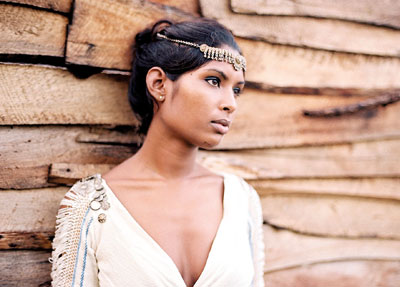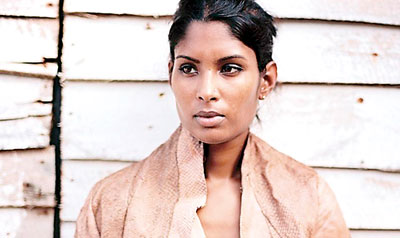More than just food for thought
View(s):At the heart of Jenny ’s line of fish leather products is a yearning to create an awareness on overconsumption, overfishing and our endangered planet
By Smriti Daniel
Incongruously, Jenny Welwert Gil likes her tuna leather smelling ever so subtly of coconut. She massages coconut butter into it to turn it a darker hue and make it fragrant. She then uses the leather to create wallets and bags, jackets and shoes for her label ‘Khogy’. Her material challenges your expectations: “Tuna leather is not fragile, if tanned properly. Its got the same luxurious feel as snake skin and the longevity of cow hide. It gets better with time and more beautiful, of course,” Jenny promises.

Jenny says she chose to name Khogy (her tagline is ‘Fishy Business’) after a secluded tribe in Colombia that consider themselves the guardians of the earth. Their message is one of conservation, “[they] want to warn us about the way we are destroying our planet through our wasteful lifestyles – an inspiring concept that we try to live by.”
Having grown up in Sweden, Jenny has been in Sri Lanka since mid-2012. For her degree in Fashion Design in the UK, she specialised in waste materials and experimental pattern cutting with the aim of extending the longevity of garments and stirring public interest in ethical fashion. Her work placements in Paris, London, Buenos Aires and Cornwall have since covered surf brands and couture alike. However, the inspiration to strike out on her own came when she finally tired of companies doing little more than paying lip service to ethical standards. Together with her cousin Caroline Welwert she launched “a company according to our own rules.”
Their rules are simple: “Conservation is at the core of this project, because let’s face it, none of us actually needs another hand bag to survive,” says Jenny. “I want to inspire people to reconsider what is currently perceived as waste and I hope to create awareness on overconsumption, overfishing and our endangered planet. The aim of Khogy is to trigger change in people.”
When Jenny first began thinking of her own line, she knew she wanted to step away from leather tanning processes that relied on heavy metals like chromium and this eventually led to an interest in natural indigenous tanning methods and fish leather. A scholarship from Konstnärsnämnden, the Swedish Art Grant Committee, made it possible for her to create her collection ‘Fish For My Unborn Children’ in Sri Lanka with local help.
Jenny recruited a team of 10 women from Sri Vimukthi Women’s Association in Negombo to work on the fish skins thrown away by a fish filleting factory outside Colombo, one which typically generates tonnes of fish skin waste each month. “The ladies tan the skins from home and the aim is that with the increase of product sales we can provide them with a constant alternative income managed between their daily duties of family life,” says Jenny, explaining that the final step in the hand tanned skins are sent to a local leather tannery to give them an odour free finish.

Fish leather jacket
Jenny hopes that even a simple fish skin bag will provide food for thought. “Fish skin is no novelty; its been used in indigenous tribes all over the world for centuries. However, it’s usually considered too expensive and time consuming to produce. But I believe fashion doesn’t have to be fast and consumption patterns can change and are changing.”
Just to make sure the point gets across, she asked artist Rah Akaishi to create a design to line all Khogy products. The ‘Six Deadly Sins’ illustrations tell the story of our troubled seas and links back to the Pangeaseed website. “This collaboration is set to continue with a special range, with half the profits going to Pangeaseed, an international ocean conservation organization,” says Jenny.
Outside tuna leather, the Khogy catalogue also boasts beautiful, romantic garments with flowing silhouettes that incorporate lace and metal work. Jenny says that Sri Lankan crafts have been a wonderful influence on her work.
“Last year I worked with palmyrah weavers, brass craftsman, handloom weavers and lace artisans to combine with tuna skins,” she says, adding, “I love all things intricate, complex and time consuming.”
See more at http://blog.khogy.com
Pix by Jenny Welwert and Luka Alagiyawanna
Follow @timesonlinelk
comments powered by Disqus




















